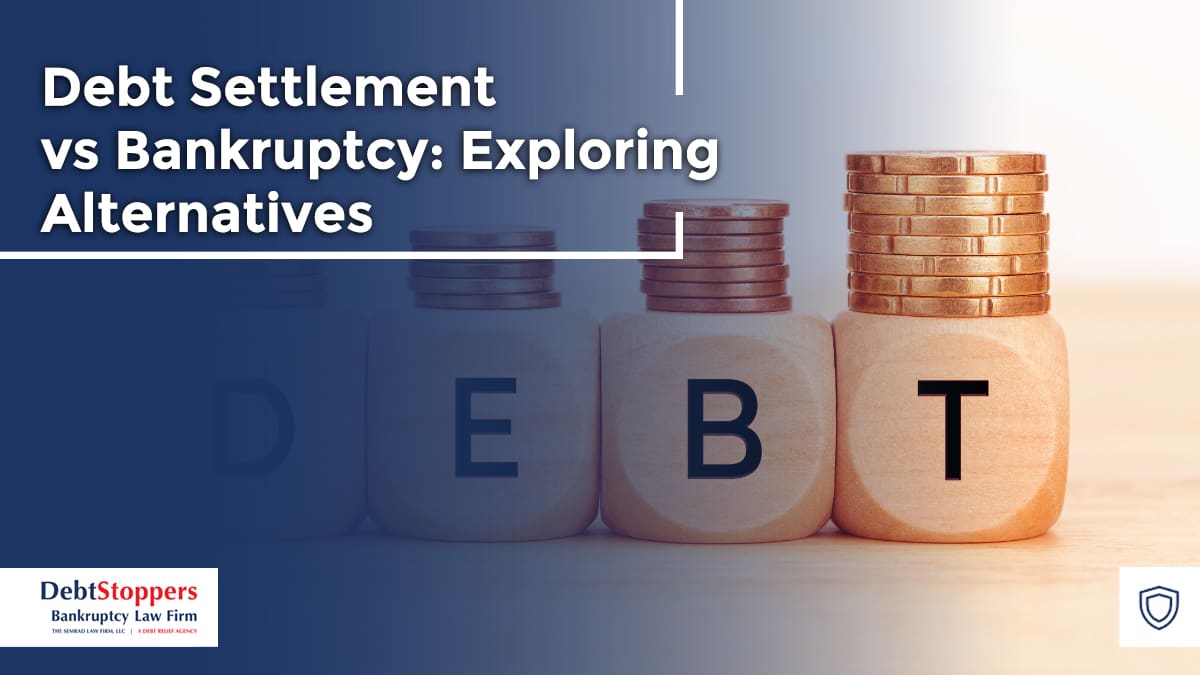When faced with overwhelming debt, many people explore debt settlement and bankruptcy. Both debt settlement and bankruptcy offer paths to relief, but they work differently and have unique pros and cons. Understanding how each process affects your finances, credit, and long-term goals is essential to making the right choice.
Your choice will largely depend on factors like how much you owe, your ability to pay, whether you have significant assets, and how much long-term credit impact you're willing to accept. Since this is a significant financial decision, it is strongly recommended that you consult with an experienced attorney who can assess your specific situation and guide you toward the best solution.
Simply put, if your debt is relatively manageable and you can pay a lump sum, debt settlement may be a realistic option. But if your debt is unmanageable or creditors refuse to negotiate, bankruptcy might offer the legal protection and debt elimination you need.
For people with consistent income who want to protect assets and pay back some debt, Chapter 13 may be ideal. However, people with little to no disposable income might qualify for Chapter 7 for a full discharge. A debt settlement attorney can help weigh your options, ensuring you move forward with confidence.

What is debt settlement?
Debt settlement involves working with creditors to reduce the total amount you owe. Instead of repaying the full balance, you agree to a lump-sum payment that satisfies the debt. Creditors are often open to negotiation because receiving something is better than the risk of recovering nothing if you file bankruptcy. This option is usually used for unsecured debts, including credit cards, medical bills, and personal loans. It is not typically effective for secured debts like home mortgages or auto loans, and it won't resolve student loans.
Debt settlement appeals to many because it avoids court filings and may help improve your debt-to-income ratio by lowering your overall obligations. In successful cases, individuals may eliminate a substantial portion of their debt. However, this route isn’t without risk. Settlement often leads to temporary credit score damage, involves fees, and comes with tax implications.
How does debt settlement work?
To begin, you’ll typically work with a debt relief attorney or a settlement company. They’ll assess your financial position, determine which debts qualify, and begin negotiating with creditors. If an agreement is reached, you pay the negotiated amount --usually in a lump sum -- and the debt is considered resolved.
While this process can result in substantial savings, it’s not guaranteed. Creditors aren’t obligated to accept a reduced payment, and many people fall behind on payments during negotiations. This can lead to a lower credit score and even lawsuits. Forgiven debt may also be considered taxable income, which could result in a higher tax bill.
Because of these risks, having an attorney represent your interests can be crucial. An experienced legal professional can negotiate on your behalf and make sure the process remains compliant with the law.
What is bankruptcy?
Bankruptcy is a legal tool that helps individuals and businesses manage, eliminate, or repay debt under the protection of the U.S. Bankruptcy Code. For individuals, the two most common types are Chapter 7 and Chapter 13.
Chapter 7, often called liquidation bankruptcy, eliminates most unsecured debts like credit cards, medical bills, and personal loans. The process is typically completed within a few months. While non-exempt assets can be sold to pay creditors, most people keep essential property like their home, car, and household items due to state and federal exemptions. Chapter 7 is often suitable for people with little to no disposable income and high unsecured debt. It offers fast relief and a clean financial slate.
Chapter 13, known as reorganization bankruptcy, allows people to repay all or part of their debt through a court-approved repayment plan over three to five years. This option is ideal for those with a steady income who want to avoid foreclosure, catch up on missed payments, and keep their assets. Both types of bankruptcy provide immediate relief through an automatic stay, which halts all collections, wage garnishments, and lawsuits as soon as you file.
Bankruptcy impacts your credit score and will stay on your credit report for seven to ten years, depending on the chapter filed. However, many filers begin rebuilding credit within a year or two.
How often can you file bankruptcy?
Bankruptcy has limits on how often you can file, based on the type of bankruptcy you previously filed and the type you want to file now. If you filed Chapter 7 and want to file Chapter 7 again, you must wait eight years between filings. If you filed Chapter 7 and want to file Chapter 13, you must wait four years. If you filed Chapter 13 and want to file Chapter 7, you must wait six years unless you paid 70% or more of your unsecured debts. If you filed Chapter 13 and want to file another Chapter 13, you only need to wait two years.
These waiting periods apply to receiving a discharge, not just the act of filing. Filing too soon can result in a denial of discharge. Always speak with a bankruptcy attorney before re-filing.
What are the pros and cons of debt settlement?
While debt settlement can offer a way out of financial hardship, it’s important to understand both the advantages and the potential downsides before deciding if it’s right for you.
Debt settlement: Pros
Debt settlement offers several advantages. It can significantly reduce the amount of debt you owe, making it more manageable. It also allows you to avoid the public process of bankruptcy, resolve debts relatively quickly, and stop collection harassment once agreements are in place. Unlike bankruptcy, debt settlement does not involve court filings, which many people appreciate for privacy reasons.
Debt settlement: Cons
There are also downsides that you should consider. Debt settlement can damage your credit score, especially if you’ve already missed payments or stopped making payments while negotiating. There's no guarantee that creditors will accept your offer, and if they refuse, you may still face lawsuits. It’s also important to know that debt settlement companies often charge high fees, and any forgiven debt may be considered taxable income, which can create a surprise tax bill.

Why should you consult with a debt settlement attorney?
Debt settlement can work, but it’s not for everyone. To avoid costly mistakes and legal trouble, it's wise to consult with an attorney who understands debt laws, creditor negotiation, and your rights. An experienced debt relief attorney can evaluate whether settlement, bankruptcy, or another option is best for your situation. They can protect you from harassment and lawsuits, negotiate directly with creditors, and help you avoid tax pitfalls. They also ensure all agreements are legally binding and in your best interest.
Attorneys are held to higher ethical standards than many settlement companies. They prioritize your financial well-being and are more likely to offer personalized, compliant solutions rather than one-size-fits-all plans.
The experienced team of attorneys at DebtStoppers has helped thousands of individuals resolve debt through Chapter 7, Chapter 13, and negotiated settlements. We offer free consultations to review your financial situation and explore the best path forward. Reach out today and let us help you regain control of your finances and take the first step to make life affordable.




